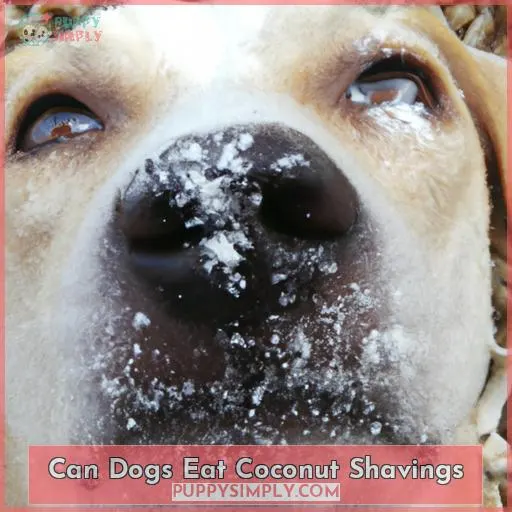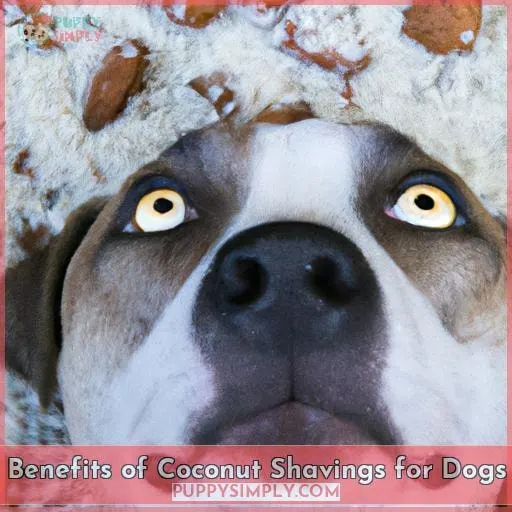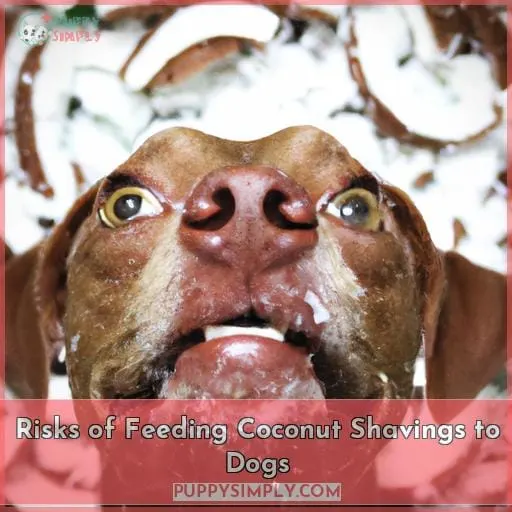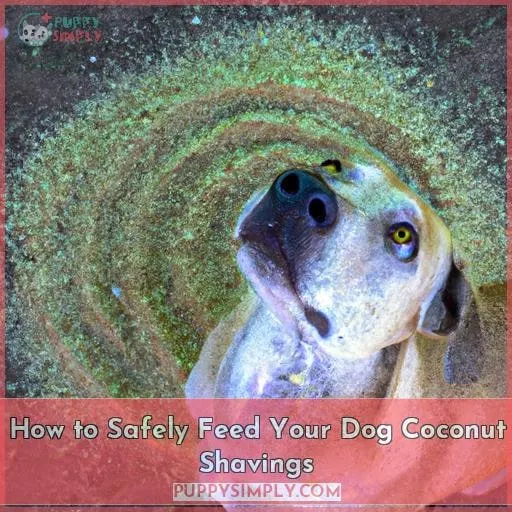This site is supported by our readers. We may earn a commission, at no cost to you, if you purchase through links.
Have you ever wondered if your pup could benefit from coconut shavings? Well, it’s a tasty and nutritious treat! But you need to know how to feed it safely, so your furry friend doesn’t end up with digestive distress or other health issues. This article will explore the nutritional value, benefits and risks of coconut shavings for dogs. We’ll also discuss how to prepare and serve them to maximize their potential goodness and minimize any risks. With the right knowledge, you can keep your pup healthy and happy with these treats!
Table Of Contents
Nutritional Value of Coconut Shavings for Dogs
You can enrich your pet’s diet with the nutritional benefits of coconut shavings! Coconut meat is high in vitamins, minerals, and healthy fat which helps support a dog’s immune system.
Pet parents should consider dietary restrictions as well as variety considerations when adding coconut shavings to their dog’s diet.
Allergies check-ups are important before incorporating this new food into their pet’s meal plan.
When serving these treats, it’s best to follow quality standards for safety purposes and ensure they have adequate coverage from their pet insurance company if needed.
Serving suggestions include small amounts at first, like one fourth teaspoon for smaller dogs or one teaspoon per day for larger ones, until you know how your pup responds to the addition of this delicious new treat!
Benefits of Coconut Shavings for Dogs
Coconut shavings are a tasty and nutritious addition to your pup’s diet, providing many health benefits that can help keep them happy and healthy. Coconut oil is a safe treat for dogs when used in moderation, as it contains healthy fats which make up an important part of their diet. For those looking for feeding alternatives, coconut milk is also highly recommended due to its numerous nutrients, like manganese, phenolic compounds and lauric acid, which have anti-inflammatory properties beneficial for the dog’s immune system.
However, it’s still best to monitor any allergy symptoms before introducing large amounts of coconut into their diet, as too much could cause digestive distress or loose stools. Veterinary advice should always be sought if you’re unsure how much coconut your pet requires or about the safety of other forms, such as sweetened coconut or husks/shells from coconuts.
Here are some great ways you can incorporate small amounts of this superfood into your pet’s meals:
- Coconut Oil Pup-Sicles – mix with frozen fruit then freeze in ice cube tray
- Coconut Peanut Butter & Honey Biscuits – use flour made from ground up dried meat plus peanut butter and oil
- Banana Blueberry Smoothie – blend banana with blueberries along with some peanut butter plus freshly pressed virgin organic oil.
It’s clear why so many owners are choosing this amazing superfruit – there really isn’t anything better than giving our four-legged friends something special without having to worry about potential harm being caused!
Risks of Feeding Coconut Shavings to Dogs
Feeding coconut shavings to your dog can be dangerous. It’s a choking hazard as they can easily become lodged in a dog’s throat or cause an intestinal blockage. Consuming too much could lead to digestive issues such as diarrhea or loose stools. High-fat content shouldn’t be overfed – it’s more than most dogs need on a daily basis.
Choking Hazard
Be mindful of the size of coconut shavings you give your pup. Large flakes can pose a choking hazard. Coconut texture is important when feeding dogs coconut shells; smaller pieces are much safer than larger chunks or whole husks. Allergy risk increases if large amounts of shreds are fed to pets, so food safety should be taken into consideration with any international cuisine containing coconut products for canine consumption.
When it comes to feeding guidelines, make sure only small pieces of the shell from coconuts (without added sugar) are given, and avoid giving any sweetened forms such as those found in some desserts or snacks meant for human consumption.
Sticking to smaller sizes will help reduce the risk associated with choking hazards while still providing your pet with essential nutrition benefits that come from incorporating this versatile fruit into their diet!
Digestive Distress
Too much of a good thing can lead to digestive distress for your pup, so be sure to keep any coconut shavings treats in moderation for optimal health. Consuming too much coconut oil or solid coconut may cause toxicity symptoms, like vomiting, diarrhea and lethargy. Allergy reactions, such as skin rashes, may also develop due to an intolerance of the food item.
Coconut is high in calories, which leads to weight gain if not monitored carefully when added into your dog’s diet. It’s best used sparingly as part of dietary change over an extended period rather than all at once. You can replace up to one cup of solid fat per day with only 1 tablespoon per 10lbs body weight given daily, mixed with other foods.
Flatulence caused by indigestible carbohydrates found in some commercial products made from shredded coconuts, or even adding large amounts (more than 2 tablespoons) of peanut butter along with a cup of coconut flour, should be avoided unless recommended by a vet specializing in canine nutritionist’s advice on specific diets tailored individually.
Diarrhea prevention strategies include limiting fiber intake while ensuring adequate hydration levels are maintained during digestion processes that involve the consumption of this type ingredient derived from real coconuts processed naturally without chemical additives.
High Fat Content
Be mindful of the high fat content in coconut shavings. It can lead to unhealthy weight gain if your pup overindulges. Coconut oil is a rich source of fatty acids and lauric acid, which are essential for healthy skin and metabolism. Too much coconut milk or sugar can contribute to weight gain due to its naturally sweet taste that dogs may find irresistible.
Obesity prevention should be top priority when introducing new treats. Limiting consumption will help keep them from consuming too many calories without sacrificing nutrition benefits. These include improved digestion, arthritis relief, body odor control, energy boosting properties, and minimization of yeast infections or fungal growths on their skin.
How to Safely Feed Your Dog Coconut Shavings
Are you looking to add coconut shavings into your pup’s diet? It can be a delicious and nutritious treat if done safely. Before feeding, make sure to:
- Feed in moderation
- Prepare the shavings properly
- Purchase only high-quality coconut shavings from reliable sources
Doing these few simple steps will ensure that your pup gets all of the benefits while avoiding any potential risks associated with consuming coconuts.
Amount to Feed
Carefully monitor the amount of coconut shavings you give your pup to ensure they don’t overindulge, as too much can lead to unhealthy weight gain. Start by introducing small amounts into their diet and be mindful that even a healthy food like coconut should not make up more than 10% of their daily calorie intake.
You should also look out for allergies or digestive distress if feeding them large portions, as this could be an indicator that your dog shouldn’t have any more white coconut fruit in its diet.
Consulting with a veterinary nutritionist such as Dr Angela Rollins is always best practice when it comes to incorporating new foods into your dog’s diet; she may recommend alternative benefits from using coconuts instead or suggest smaller portion sizes depending on other factors in the animal’s lifestyle.
It’s important to keep freshness at top priority when storing leftover treats by keeping them cool and dry so they retain their nutritional value longer!
Preparation Tips
With the right preparation, you can ensure your pup safely enjoys delicious coconut shavings without worry! Start by mixing small amounts of shredded coconut with food as a flavoring or treat alternative. Coconut is also a great natural sweetener to add to dishes or snacks for your dog.
For raw consumption, try unsweetened coconut milk mixed with peanut butter (1/4 cup) in place of regular milk and cream-based treats that could contain unhealthy sugars and fats.
When introducing new foods into their diet, it’s important to pay attention to essential fatty acid levels so they don’t have an adverse reaction from digestion issues caused by consuming too much fat at once.
Following these simple steps will help keep your pooch happy and healthy while they enjoy all the benefits this superfood has to offer!
Choosing High-quality Coconut Shavings
When it comes to selecting coconut shavings for your pup, make sure you choose only the highest-quality – they’ll love it! Freezing temperatures can cause coconut oil to become solid and hard, so store it in an airtight container in the fridge or freezer.
Check for any food allergies before introducing this new treat into your pup’s diet. In moderate amounts (1/4 teaspoon per 10 lbs of body weight), coconut oil can help keep their skin healthy and coat shiny.
Coconut sugar has a low glycemic index, making it a healthier alternative than cane or beet sugar. Add 1 cup of water if needed when using as part of treats or meals.
Be mindful though – too much could lead to stomach upset, so portion sizes should always be monitored carefully. Moderation is key!
Frequently Asked Questions (FAQs)
Is it okay to give my dog coconut shavings every day?
No matter the size of your pup, adding small amounts of good-quality coconut oil to their diet can be beneficial. It may not be recommended as a sole source of dietary fat for dogs, but incorporating coconuts into the mix offers plenty of flavoring benefits and treat alternatives. Coconut oil can provide a range of allergy reliefs and snack ideas that wouldn’t otherwise exist in your pup’s diet; plus it has antibacterial, antiviral, and anti-fungal properties!
Always consult with your vet before introducing any new foods to ensure safety. They’ll help determine what kind is best suited for Fido’s needs and recommend maximum serving sizes based on weight. With these guidelines in place, you’ll have all the tools necessary to offer unique snacks while still keeping an eye out for potential allergies or sensitivities.
Are there any age restrictions for giving my dog coconut shavings?
You may be wondering if there are any age restrictions for giving your pup coconut shavings. Generally, it’s safe to give dogs of all ages coconut shavings as long as you use portion control and monitor their reactions carefully. However, puppies under one year shouldn’t have more than a teaspoon per day due to potency restrictions, which could lead to allergic reactions or food allergies specific to coconuts.
Look out for signs such as loose stools or changes in your pup’s bowel movements after consuming the treat. That way, you can determine if they’re having an adverse reaction before continuing with further consumption.
Coconut oil offers skin-protecting properties and can be used topically on dry paw pads. Homemade treats such as ‘coconut oil pup-sicles’ offer a nutritious alternative when fed with care.
Can I give my dog coconut shavings if he/she has a sensitive stomach?
You can give your pup coconut shavings if they have a sensitive stomach. It’s important to be mindful of the feeding guidelines and store the coconut safely. Coconut oil is an excellent addition to dog food as a supplement and has many benefits for dogs with allergies or diarrhea prevention due to its high content of fatty acids. But too much consumption can lead to adverse effects, so make sure you feed it in moderation as part of their regular diet – not more than one teaspoon per day – or use homemade treats that contain small amounts like K9 Granola Factory Coconut Chips. If you notice any discomfort after eating coconut products, contact your vet for emergency care advice.
How much coconut shavings should I give my dog?
When it comes to feeding your pup coconut shavings, moderation and careful consideration are key. Start with small amounts (1/4 tsp for small dogs or 1 tsp for large dogs) and monitor their reactions. If no adverse effects occur after 24 hours, you can gradually introduce more as needed. Coconut shavings offer beneficial nutrients such as lauric acid, phenolic compounds and manganese which aid in reducing inflammation and supporting the immune system. But, it shouldn’t be the sole source of dietary fat in a dog’s diet.
When introducing grain-free alternatives like coconut flour instead of wheat flour into recipes like banana blueberry smoothies or homemade treats, consider storage tips from experts on how to keep them fresh longer. Also, keep allergy considerations in mind when discussing any dietary changes with your vet before implementation.
Is it okay to feed my dog coconut shavings as a snack?
Feeding your pup coconut shavings as a snack is generally safe, but you should consider several factors first. Coconut shavings are comprised of the outer shell of coconuts and have a low glycemic index, making them an ideal snack for dogs with dietary restrictions.
However, since they contain healthy fats it’s important to monitor your pup’s bowel movements after consumption.
Additionally, not all pups like the taste or texture of coconut, so try offering small amounts at first before serving larger quantities in the future.
Lastly, if you buy pre-shaved coconut flakes, ensure they don’t contain any added sugar or preservatives, which could cause allergies and other health issues for your pet!
Conclusion
In conclusion, coconut shavings can be a nutritious and beneficial addition to a dog’s diet with the right amount and preparation. Just like the coconut itself, the shavings can be a symbol of nourishment and health.
With the right amount, preparation, and quality, the shavings can bring some much-needed vitamins, minerals, and healthy fats to your pup’s diet.
But like all things, moderation is key. Too much of a good thing can become a bad thing, so be sure to consult with your vet before adding coconut shavings to your pup’s diet.










